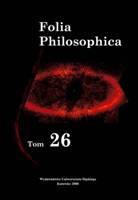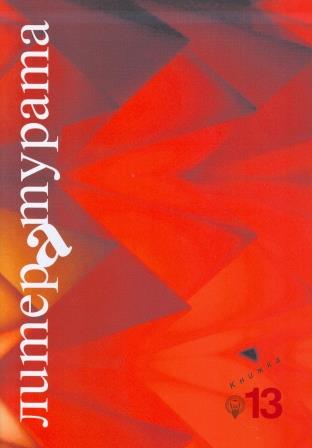
Jan Duns Szkot: "Ordinatio" (translation)
Jan Duns Szkot: "Ordinatio" (przekład)
Keywords: Jan Duns Szkot; Ordinatio
More...
Keywords: Jan Duns Szkot; Ordinatio
More...

Keywords: ratiovitalism; life; reality; overcoming; freedom
The conception of life as a radical and fundamental reality, which constituted the basis for the conception of ratiovitalism, is a late and mature philosophical reflection by José Ortega y Gasset. Its source is a critical attitude and willingness to overcome both vitalism and rationalism in their pure shape and form. However, one should remember that the notion of “overcoming” in this case ought not to be identified with a total rejection. Though, it is the familiarization and adaptation of thoughts of these two extremely different standpoints that can lead beyond their scope and freedom from restrictions they bring with them. To talk about a ratiovital perspective, one should, according to Gasset, begin his/her reflection from a thorough and critical analysis of the two points of view to, subsequently, make a synthesis of the important things and overcome their linearity and limitlessness.
More...Keywords: health tourism; wellness tourism; consumer behaviour; push and pull factors; behavioural health risk factors; socio-economic health risk factors
Health consciousness is one of the most important consumer trends. Health status and everyday stress triggers the need to travel more frequently. The following questions arise: how can health risk factors perceived and consequently, how can the identified factors assign health consciousness and the purchase of health-related tourism products. This paper aims to unfold consumer’s awareness of health risks leading to the consumption of health tourism. Uncertainty before travelling is arising from everyday life, specifying the needs originating (directly) from the lifestyle and (indirectly) from health status. In this paper first we present HWT system and the different health risk factors, as well as Dunn’s push and pull factors theory. Secondly, based on the results of a quantitative research we identify both push and pull factors in the case of Hungarian HWT tourists.
More...Keywords: Medical Tourism; Personal Values; List-of-Values (LOV); Service Quality; SERVQUAL
This exploratory research investigated the relationship between U.S. medical tourists’ personal values and their expectations and perceptions of the service quality of healthcare facilities located outside the U.S. Based on a sample of U.S. consumers, who had traveled abroad for medical care, stepwise regression results indicated that personal values, in particular self-fulfillment, warm relationship with others, sense of accomplishment, security, self-respect, and excitement, significantly predicted U.S. medical tourists’ expectations and perceptions of the service quality of foreign healthcare facilities. The study establishes a foundation for future research on the role of personal values in medical tourists’ evaluation of service quality in the rapidly growing medical tourism industry.
More...Keywords: quality of life; well-being; health tourism; Hungary
A society’s and individuals’ quality of life has long been in the focus of social science research. The subjective aspect of one’s quality of life is usually assessed through a person’s perceived satisfaction with their own life. In comparison, the indicators and methodological approaches used by researchers trying to objectively measure quality of life are more varied and complex. However, both the correct identification of the factors influencing objective quality of life and the longitudinal evaluation of quality of life on the local level have remained a serious challenge. The paper presents the results of an experimental study carried out by the HAS Geographical Research Institute in co-operation with the Kodolányi János University of Applied Sciences that aims to provide deeper understanding of tourism-oriented quality of life in Hungary. Although the research raised a large number of new questions as well, in this paper we discuss the development mechanisms of an indicator system that may fit within the currently used system of social indicators and may provide useful information on the interrelationship of tourism and quality of life. The development of the indicator system includes the delineation of the research area, the creation of the related dimensions and sub-dimensions, and finally the identification of indicators within the sub-dimensions. The indicator system is based on data available at the Hungarian Central Statistical Office, derived from regular data collection methods. Due to the obvious symbiosis of health and quality of life, a special emphasis is put on measuring tourism-oriented quality of life factors at Hungarian health tourism destinations.
More...Keywords: health tourism; wellness; tourism; Jamaica; sustainability
As with many countries, tourism has proven to be a vital source of revenue for the Caribbean Island nation of Jamaica. As a popular vacation destination for tourists seeking sun, sea, and sand, Jamaica has attracted substantial numbers of visitors from around the world over the years. However; emerging forms of tourism present opportunities for Jamaica to enhance its competitive position in the sector. One such form of tourism is health tourism. This study examines the current state of health tourism in Jamaica along with its potential for future growth and related challenges. The paper also examines the key role of sustainability in advancing a successful health tourism sector in Jamaica.
More...Keywords: health tourism; balneary-spa tourism; wellness; medical tourism; Romania
The Romanian health tourism, based on its exceptional natural resources represents an important segment of the tourism industry. Old tradition of valorization of thermal waters, mineral springs, mofettes curative mud spa treatments are intertwined nowadays with various forms of medical tourism, some practiced for over four decades (the Ana Aslan geriatric treatment) and others being more recent (cosmetic surgery, dental care, eye surgery, etc).The main purpose of this article is to analyze the evolution of medical tourism, especially of spa tourism in Romania, one of the richest countries in Europe in terms of extent and excellence of specific natural resources, with old and unsuitable infrastructure if referred to the public spa facilities, but with modern facilities in wellness and medical private units. The research is both quantitative and qualitative. The first method is based on statistical analysis of data provided by the National Statistics Institute of Romania. The qualitative analysis complements the previous one, which is not extremely detailed and is also not available for a long period of time. The research reveals unequal evolution of the Romanian spa tourism, a severe discrepancy between the quality of specific resources and the existing spa infrastructure, contradictory demand, as well as positive trends for the medium-term future. As a research method we used first of all the qualitative analysis – the available statistical data are rather scarce. The research reveals the lack of investments and the necessity of implementation of a whole host of local plans as part of a new national strategy for tourism industry.
More...Keywords: old salt roads; resort tourism potential; image profile; saline health tourism; thematic tourist routes
This paper investigate historical premises of the old salt routes, roads called the ancient or medieval trade route on which the salt was barely transported from the extraction point to the trading one, back then being an extremely valuable trading product. Nowadays these roads have an important role in promoting the saline health resorts in Transylvania developed on the former mining exploitations. The tourist potential and image analysis reveals that both those in desolation and those recently upgraded are lacking a unified promotion that could bring them great profit by raising the number of tourists. We also bring some proposals for these thematic tourist routes.
More...
This article focuses on the distinction between Women’s Studies as an academic entity and feminism as a social movement. The author of the article questions the assumption that the political future of Women’s Studies as a field can be guaranteed by repairing the distinction between academic institutionalization and feminism as a world changing social force. The author worries more about the implications for Women’s Studies of refusing altogether the distinction between the academy and activism than about the difficulty of repairing the distinction between them.
More...

On the occasion of the second edition of La donna contro se stessa (Women against Themselves), Carla Ravaioli reread her book and commented on pre-feminist Italy and the circumstances and facts, which influenced the women’s struggles there and gave rise to the powerful wave of feminism in the late 1970s. The female author concluded that although society still continued to be dominated by the sign of the “male”, women were establishing themselves ever more steadily as a reforming power with its own voice in history.
More...
“The life – the only way to (…) // distinguish the pain/ from all things it is not like“. The Attempt to Read the Poems „Agony“, “Commenced Short Story“, “Identification“ (transl. by Radostina Petrova) / Main problem of this paper is the motif of suffering in some text of Polish Nobel laureate Wislawa Szymborska. The problem of torture and its effect on individuality is represented in comparison of Szymborska’s poem Tortures and Jean Amèry’s essays Jeneseits von Schuld und Suhne. Similar topics, the moments in which an event is also inevitable reality, are represented in two other poems of Szymborska – Beginning of a story and Identification. Untypically for Szymborska there texts give a women’s point of view, her-story.
More...


The focus of this essay is Kathy Acker’s 1982 novel Great Expectations. The text attempts to make a reading of that extraordinary work by focusing on its playful and Protean nature and by “mapping out” the rhetorical strategies Acker uses in her response to various oppressive discourses of power.
More...
The article is dedicated to the untold until now relation between Wisława Szymborska’s poetry and Bolesław Leśmian poetic world. The intertextual figures are not obvious nor bright-line because they are to be found in Szymborska’s and Leśmian’s core understanding of the role played by poetry seen as an escape out of language, out of its crave for definitions and quantifiers. The article is centered on one of the earliest Szymborska’s poems – Kelpie, which is titled as one of the most famous Leśmian’s poems. It also gives account of numerous references to Bolesław Leśmian in Szymborska’s interviews, speeches and opinions, shared with her friends.
More...
According to the mass media, a postfeminist era emerged in the 1990s. The first objective is to develop a definition of the postfeminist perspective. Based on an informal content analysis of popular articles, the authors identify four postfeminist claims: (1) overall support for the women’s movement has dramatically eroded because some women (2) are increasingly antifeminist, (3) believe the movement is irrelevant, and (4) have adopted a “no, but... “ version of feminism. The second objective is to determine the extent of empirical support for these claims. Using existing public opinion data, the authors find little support for the four postfeminist claims. Implications of the unsubstantiated post-feminist argument are discussed.
More...
The article explores the emerging feminist project in post-communist Bulgaria and the post-Soviet bloc as a whole as a process of adopting and adapting Western liberal ideas in the building of civil society in the 1990s, further consolidated by the integration in the European Union and its new standards for gender equality and anti-discrimination policies. Using the methodology of cultural translation this incomplete and uneven project is viewed as feminism in/ as translation, i.e. not simply cultural transfer of foreign feminist ideas and practices but a complex process of translation, involving strategies of negotiation and resistance, of re-signification of meanings and re-writing of feminist knowledge as well as social transformation.
More...